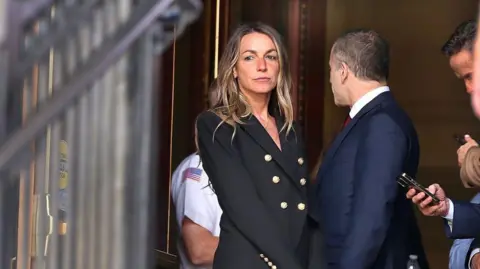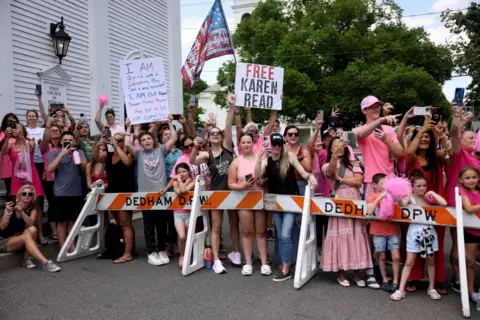- Asia
Anyone for tennis? An insider guide to London’s new wave of social clubs
时间:2010-12-5 17:23:32 作者:News 来源:Life 查看: 评论:0内容摘要:The Hajj is the annual pilgrimage to Mecca, Saudi Arabia, and it is the fifth and final pillar of Islam, along with declaration of faith (shahada), five daily prayers, obligatory charity (The Hajj is the annual pilgrimage to Mecca, Saudi Arabia, and it is the fifth and final pillar of Islam, along with declaration of faith (shahada), five daily prayers, obligatory charity (
“We’re here today to celebrate a blockbuster agreement that will ensure this storied American company stays an American company,” Trump said at the outset of his speech.But the merger between Nippon Steel and US Steel had been controversial, and it was largely opposed by labour unions.

Upon returning to the White House in January, Trump initially said he would block the acquisition, mirroring a similar position taken by his predecessor, former US President Joe Biden.However, he has sincehis stance and backed the deal. Last week, he announced an agreement that he said would grant Nippon only “partial ownership” over US Steel.

Speaking on Friday, Trump said the new deal would include Nippon making a “$14bn commitment to the future” of US Steel, although he did not provide details about how the ownership agreement would play out.“Oh, you’re gonna be happy,” Trump told the crowd of steelworkers. “There’s a lot of money coming your way.”

The Republican leader also waxed poetic about the history of steel in the US, describing it as the backbone of the country’s economy.
“The city of Pittsburgh used to produce more steel than most entire countries could produce, and it wasn’t even close,” he said, adding: “If you don’t have steel, you don’t have a country.”Today, Vallejo dedicates his time to human rights activism. He presides over the Catalan Association of Former Political Prisoners of Francoism, created in the final years of the dictatorship.
He learned about synthetic memories through Iridia, a human rights organisation that collaborated with DDS to help visualise memories of police abuse victims during the regime in a central Barcelona police station.Vallejo was drawn to the project, curious about how the technology might be applied to capturing resistance activities too dangerous to record during Franco’s rule.
In 1970, SEAT workers organised clandestine breakfasts in the woods of Vallvidrera. On Sunday mornings, disguised as hikers, they would make their way through the dense forests surrounding the Catalan capital to discuss the struggle against the dictatorship.“I think I must have been to more than 10 or 15 of these forest gatherings,” Vallejo recalls. Other times, they met in churches. No records of these exist.
- 最近更新
- 2025-07-07 05:22:06Gaza babies face starvation as Israel blocks entry of baby formula
- 2025-07-07 05:22:06Heathrow warns of weakening demand for US business travel
- 2025-07-07 05:22:06Start-up named after the dragon’s mountain in ‘Lord of the Rings’
- 2025-07-07 05:22:06The 5-Ingredient Tomato Salad I Make All Summer Long
- 2025-07-07 05:22:06Fixing up Nike is a marathon, not a sprint
- 2025-07-07 05:22:06Gender gap in law at risk of widening amid diversity pullback
- 2025-07-07 05:22:06Red flags to watch out for before choosing a financial advisor
- 2025-07-07 05:22:06Sean Combs trial update: The jury is deliberating over a complex set of charges
- 热门排行
- 2025-07-07 05:22:06cutting back on monthly expenses
- 2025-07-07 05:22:06Why the serial CEO has fallen out of fashion
- 2025-07-07 05:22:06One-Pan Paprika Chicken with Potatoes and Tomatoes
- 2025-07-07 05:22:06FirstFT: US officials scale back trade deal ambitions
- 2025-07-07 05:22:06world's largest cruise ships
- 2025-07-07 05:22:06Data underscores severe challenge facing Labour government as it seeks to cut irregular migration
- 2025-07-07 05:22:06prompting slides to be deployed
- 2025-07-07 05:22:06The joy of the office packed lunch
- 友情链接
- Your pictures on the theme of 'glass' Is Britain really inching back towards the EU? Fleeing US deportations, it took this family three tries to enter Canada Gaza warehouse broken into by 'hordes of hungry people', says WFP 'Give it time' - ScotRail defends AI announcer Iona The secretive US factory that lays bare the contradiction in Trump's America First plan 'I didn't know my hoarding was a mental illness' An Indian teacher was killed - then he got falsely labelled a terrorist Nvidia revenues surge despite tariff uncertainty Who should you trust for a weather forecast? Amazon tribe sues New York Times over story it says led to porn addict claims Start of new inter-island ferry service postponed Wildfire blazes in woods for eight hours Yungblud 'excited' for music festival to return Judge in Diego Maradona case accused of behaving like an 'actress' Workers optimistic but overwhelmed by AI - study What we know about Israeli embassy staff shooting Yungblud 'excited' for music festival to return Gavin & Stacey's Ruth Jones gets award at Hay Festival Wildfire warning sign placed in Peak District Gold is booming - but investors lured in by the hype could lose out, warn experts Kings of Leon cancel UK dates after 'freak' accident Youth charity takes over High Street art gallery No sequins or dancing at EU summit - but it'll be an extravaganza nonetheless On the South African road incorrectly identified as a 'burial site' by Trump India's colonial past revealed through 200 masterful paintings Iran's Palme d'Or-winning director cheered as he arrives home Firefighters fundraise after UK colleagues killed Why Succession creator Jesse Armstrong is writing about rich people again Mars phases out controversial colour additive in Skittles
